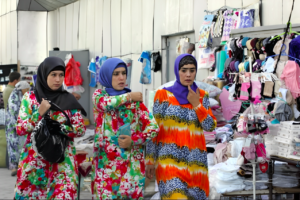The economy of Gaza has ground to an almost total standstill as a result of the war between Israel and Hamas that has left about 85% of workers without jobs, the World Bank has said.
In an assessment of the economic impact of the two-month-long conflict, the Washington-based development organisation said Gaza was operating at only 16% of its productive capacity and was in “deep recession”.
The Bank announced that to help ease Gaza’s humanitarian crisis, it was providing $20m (£16m) in new financial help, split evenly between food and medical supplies, which would be delivered via UN agencies.
“The loss of life, speed and extent of damages to fixed assets and reduction in income flows across the Palestinian territories are unparalleled,” the Bank’s report said.
“As of the second half of November, roughly 60% of information and communications technology (ICT) infrastructure, 60% or more of health and education facilities, 70% of commerce-related infrastructure are damaged or destroyed in Gaza.
“Similarly, nearly half of all primary, secondary and tertiary roads are damaged or destroyed. More than half a million individuals are without a home as a result of the conflict.”
Since the start of the conflict on 7 October, economic activity had come to a “near-complete standstill”, the World Bank said. Six years ago, the Bank found that 45% of people in Gaza were suffering from multidimensional poverty – low incomes and a lack of access to education and basic infrastructure – but the numbers had increased as a result of the war.
The report said: “Massive internal displacement, destruction of homes, assets and productive capacity, along with a deep recession have pushed even more Gazans below the poverty line and deepened poverty for those already vulnerable.
“Multidimensional poverty in Gaza has also skyrocketed due to the hostilities that have seen the discontinuation of school access for children, as well as the difficulties related to accessing health and other basic services.”
The report also highlighted increasing inflationary pressure and shortages of basic goods.
Prices in Gaza increased by 12% in October, reflecting pent-up demand for products that were increasingly difficult to find locally. Food prices increased on average by 10% month-on-month, bottled water was up by 75% and petrol increased by close to 120%.
The report said: “Massive shortages of basic products have severely limited the capacity of hundreds of thousands of households to purchase them, regardless of whether they can afford them. Shrinking supply and rising prices are having substantial adverse impacts on household welfare.”
Source: The Guardian











